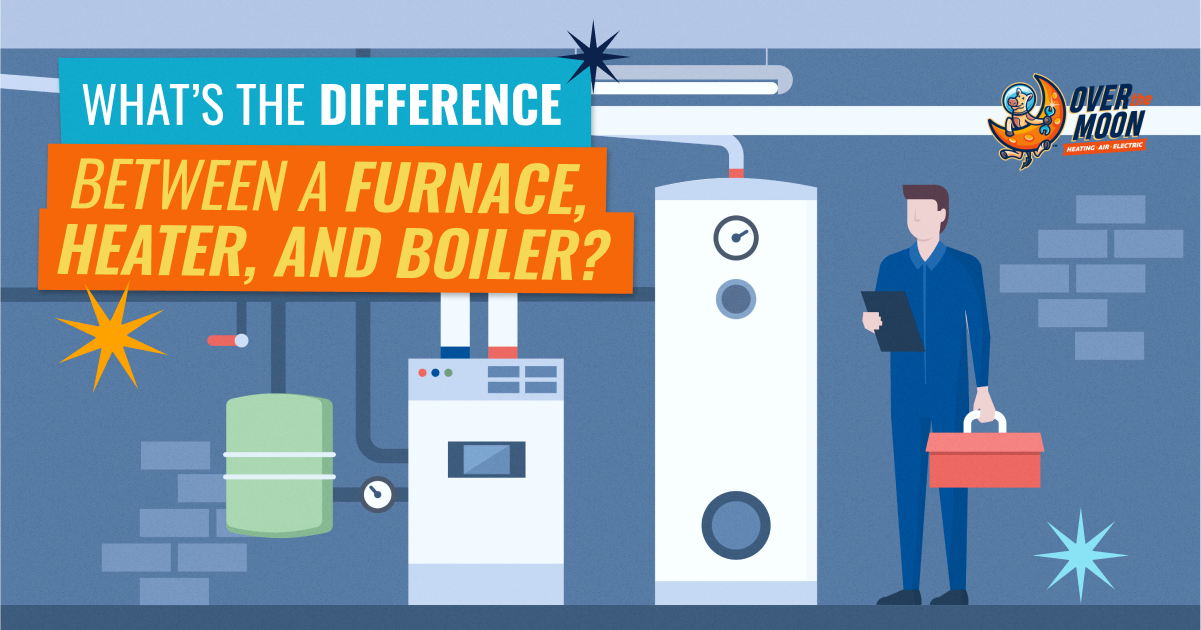People often talk about furnaces, heaters, and boilers in the same context. It’s important to note these terms are not interchangeable. Nonetheless, all three provide heat, so they serve the same purpose but require different heating services to address specific installation, repair, and maintenance needs. To clear up any misconceptions, here’s an overview of each to explain what it is and how it works.
How Does a Furnace Work?
A furnace is an appliance that creates heat. It has taken different forms over the years, from stone or clay structures that used wood or coal to heat homes and buildings to more compact metal units that use gas or oil for combustion or electricity to power heating elements. No matter what type of furnace you have, it’s what produces heat. Other equipment distributes heated air throughout a building, namely a blower that pushes air into the ductwork.
How Does a Heater Differ From a Furnace?
A heater is not a primary heating unit, as its name suggests. Instead, it is what distributes warm air around your home. An individual heater can be designated for a specific area or space. It typically has heating coils that transform electrical energy into heat. Resistance heating units are a common type of electric heating system. Central heating units are often found in the basement or attic, while space heaters are intended to provide warmth in individual rooms.
By contrast, a furnace doesn’t move the air that it heats. A heat pump is a type of heater that transfers warmth into the air that it can move from its heating elements or a furnace to the rest of your home.
What Is a Boiler?
A boiler also provides heat. However, it usually does so by heating water, which is then pumped through a heating system (thus, it’s called a hydronic heating system). Water is heated in the boiler’s combustion chamber and then pumped through small pipes throughout your home. These pipes lead to fixtures such as radiators or baseboards, or they can supply radiant floor heating systems.
The piping system connected to a boiler forms a loop. Once hot water is pumped through heating components, it returns to the combustion chamber. The energy for boiling water may come from gas, burning wood pellets, or electricity. Some boilers generate steam and send it into pipes instead of water. Another cool fact about boilers is they can double as water heaters and supply hot water for your kitchen, bathroom, and washing machine.
Should l Have a Furnace or a Boiler?
Generally, furnaces are less costly and time-consuming to install. They’re unlikely to freeze in winter. However, they can create drafty environments, while ductwork can often be a source of allergens. Gas furnaces also come with the risks of natural gas or carbon monoxide leaks. A boiler, while more expensive upfront, is more energy-efficient, less noisy, and produces more comfortable heat. It does not require ductwork to move air, which is great for indoor air quality, and heated water can be reused, so little is wasted.
*To maintain optimal air quality with a furnace, regularly change the air filter, schedule periodic ductwork inspections and cleanings, and keep up with annual maintenance.
How Do I Maintain My Heater for Optimal Performance?
A technician must maintain a furnace’s combustion chamber, burners, and gas connections. Heater maintenance is generally more straightforward. Aside from changing air filters at least every three months:
- Clean dirt and debris from around the system
- Make sure the vents are clean and unobstructed
- Remove dirt, dust, and debris from evaporator and condenser coils
Without proper maintenance, a furnace or heater can become inefficient and a fire hazard. Both systems require annual tune-ups to run smoothly and efficiently. A tune-up can also help a boiler run more efficiently and determine if you could benefit from any upgrades.
Schedule Heating Services with Over the Moon
We recommend scheduling heating maintenance once a year, before winter. It allows our technicians to address any issues and improve comfort and energy efficiency. They’re trained, licensed, and equipped to handle any problem, no matter what type, make, or model of furnace you have. Addressing furnace issues promptly eliminates safety and health hazards due to cold temperatures, gas leaks, and indoor air quality concerns.
Our team provides high-quality furnace installation, repair, replacement, and tune-ups. To schedule an appointment or learn more about our heating services, call (262) 218-2857 today.

